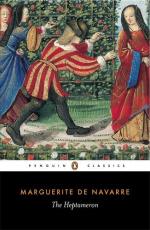The Queen of Naples, being wronged by King Alfonso, her husband, revenged herself with a gentleman whose wife was the King’s mistress; and this intercourse lasted all their lives without the King at any time having suspicion of it.(1)
I have often desired, ladies, to be a sharer in the good fortune of the man whose story I am about to relate to you. You must know that in the time of King Alfonso,(2) whose lust was the sceptre of his kingdom,(3) there lived in the town of Naples a gentleman, so honourable, comely, and pleasant that his perfections induced an old gentleman to give him his daughter in marriage.
1 This story is historical.
The events occurred at Naples
cir. 1450.—L.
2 The King spoken of in this story must be Alfonso V., King of Aragon, who was born in 1385, and succeeded his father, Ferdinand the Just, in 1416. He had already made various expeditions to Sardinia and Corsica, when, in 1421, Jane II. of Naples begged of him to assist her in her contest against Louis of Anjou. Alfonso set sail for Italy as requested, but speedily quarrelled with Jane, on account of the manner in which he treated her lover, the Grand Seneschal Caraccioli. Jane, at her death in 1438, bequeathed her crown to Rene, brother of Louis of Anjou, whose claims Alfonso immediately opposed. Whilst blockading Gaeta he was defeated and captured, but ultimately set at liberty, whereupon he resumed the war. In 1442 he at last secured possession of Naples, and compelled Rene to withdraw from Italy. From that time Alfonso never returned to Spain, but settling himself in his Italian dominions, assumed the title of King of the Two Sicilies. He obtained the surname of the Magnanimous, from his generous conduct towards some conspirators, a list of whose names he tore to pieces unread, saying, “I will show these noblemen that I have more concern for their lives than they have themselves.” The surname of the Learned was afterwards given to him from the circumstance that, like his rival Rene of Anjou, he personally cultivated letters, and also protected many of the leading learned men of Italy. Alfonso was fond of strolling about the streets of Naples unattended, and one day, when he was cautioned respecting this habit, he replied, “A father who walks abroad in the midst of his children has no cause for fear.” Whilst possessed of many remarkable qualities, Alfonso, as Muratori and other writers have shown, was of an extremely licentious disposition. That he had no belief in conjugal fidelity is evidenced by his saying that “to ensure domestic happiness the husband should be deaf and the wife blind.” He himself had several mistresses, and lived at variance with his wife, respecting whom some particulars are given in a note on page 69. He died in 1458, at the age of seventy-four, bequeathing his Italian possessions to Ferdinand, Duke of Calabria, his natural son by a Spanish beauty




